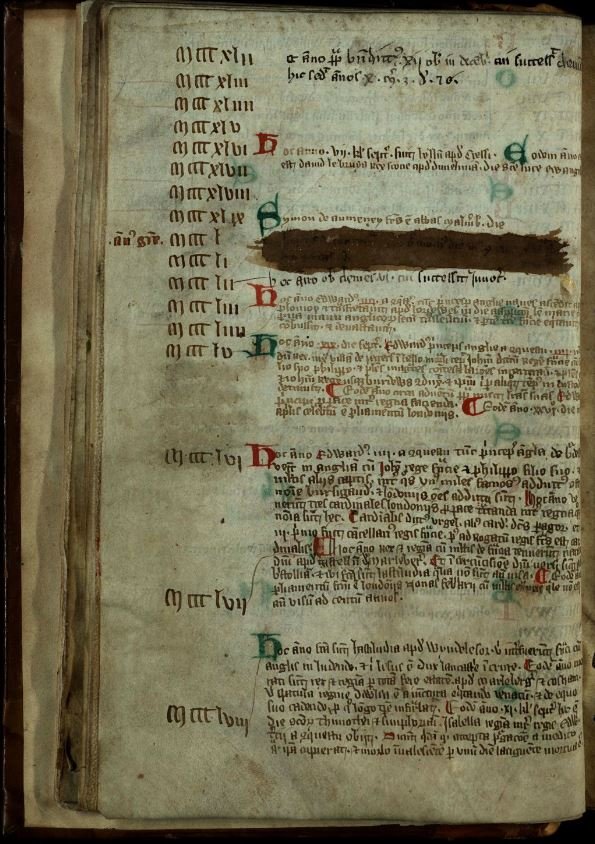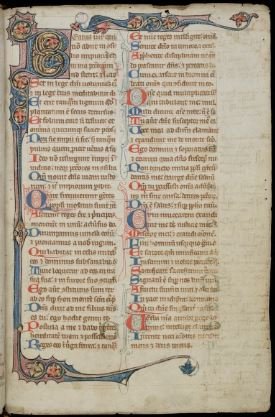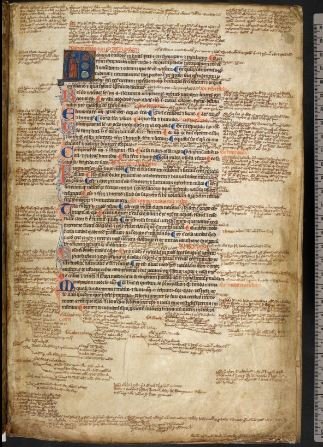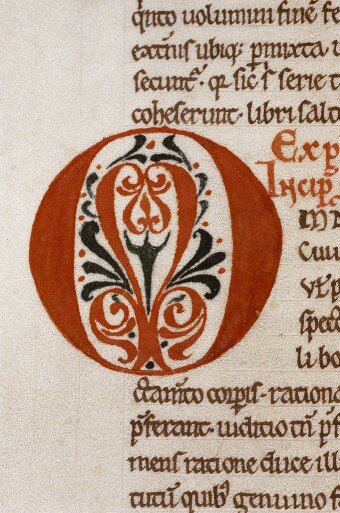
Malmesbury’s Medieval Library
The medieval library in Malmesbury Abbey once held many precious manuscripts. Over 30 are known to exist in different libraries around the world today and roughly half have been digitised. We have created a virtual library of these manuscripts below.
You can also read and download the story of The Medieval Library of Malmesbury Abbey.
All image copyright information is included in the detailed information for each document.
Willelmus Malmesburiensis de Gestis Pontificum
The Gesta Pontificum Anglorum (Latin for "Deeds of the Bishops of the English"), is an ecclesiastical history of England written by William of Malmesbury in the early 12th century. It covers the period from the arrival of St Augustine in AD 597 until the time it was written.
Click the title for full details
The Eulogium Historiarum is a universal chronicle from the Creation to 1366 in Latin prose, drawn from various sources, some listed in a poem; probably written by a monk (to whom different names have been attached, although internal evidence suggests Thomas) at Malmesbury Abbey in Wiltshire. Five books cover biblical and secular history, with some geography and a monastic chronology.
Click the title for full details
Johannes Scotus Erigena. Evangelium S.Lucae.
St. Luke’s Gospels translated by John Scotus Erigena. He is generally recognized to be both the outstanding philosopher of the Carolingian era. Erigena's uniqueness lies in the fact that, quite remarkably for a scholar in Western Europe in the Carolingian era, he had considerable familiarity with the Greek language.
Click the title for full details
Short Psalter with liturgical calendar and litany of the Saints from the early 14th century. Illustrated with artful initials and margin borders composed of leaves, flowers, animals and human heads.
Click the title for full details
Articella
Ars Medicinae, the compilation of medical texts of Greek, Byzantine, and Arabic origin that is known as the Articella. Since the early 12th century most texts were translated into Latin by scholars in the circle of the medical school of Salerno, and became the basis of the medical curriculum in European universities and remained in use until the 16th century.
Click the title for full details
Martianus Capella, De nuptiis Philologiae et Mercurii ("On the Marriage of Philology and Mercury"), is an influential commentary on the liberal arts written by the fifth-century author Martianus Capella. The book was of great importance in defining the standard formula of academic learning from the Christianized Roman Empire of the fifth century until the Renaissance of the 12th century.
Click the title for full details
Prudentius
Prudentius’s Psychomachia, which means ‘Battle of the Soul’, is the first fully allegorical work in the European literary tradition. It describes the battle between the vices and virtues for the Christian soul.
Click the title for full details
Gregory the Great, De cura pastorali.
A manuscript of Gregory the Great's Pastoral Care from the branch of the textual tradition which is closest to that used in King Alfred the Great's translation.
Click the title for full details
Miscellanea historica et iuristica.
Historical and legal texts, collected by William of Malmesbury. Includes collection of Roman history.
Click the title for full details
De natura rerum
Computistical texts pulled together including those by Isidore and Robert of Hereford. List of books in the handwriting of William of Malmesbury.
Click the title for full details
Policraticus
Political science written by John of Salisbury.
Click the title for full details
Junillus Africanus, Instituta regularia divine legis
Vite sanctorum. Junillus Africanus (d. 548/9) was Quaestor of the Sacred Palace (overseeing judicial matters) in the court of the Byzantine Emperor Justinian I. Text helps to understand how Byzantium accommodated Roman law as Roman and Christian theories converged.
Click the title for full details
The Gesta Pontificum Anglorum (Latin for "Deeds of the Bishops of the English"), is an ecclesiastical history of England written by William of Malmesbury in the early 12th century. It is in the hand of William of Malmesbury.
Click the title for full details
The works of St Anselm an Italian Benedictine monk. Archbishop of Canterbury 1093-1109 and famed as the originator of the ontological argument for the existence of God.
Click the title for full details
Orations by Marcus Tullius Cicero a scribe whose hand occurs in other Malmesbury manuscripts
Click the title for full details
A copy of a translation of the Gospels in Old English, copied in one hand in 11th century. Two other hands wrote a translation of a bull of Pope Sergius in favour of Malmesbury.
The manuscript was damaged in the fire of 1731.
Click the title for full details
Cartulary -Register of Malmesbury Abbey
Contains:
1. Documents relating to Richard, Earl of Cornwall
2. Copy of an inquest held by William de Clifford upon the customs and services of Malmesbury
3. Short commentary on Samuel 1
4. Chapters of the chartulary almost as printed in the Rolls series
5. Life of St Thomas of Canterbury by John of Salisbury
6. Alcuin’s answers to the interrogatories of Siwlf upon Genesis
Click the title for full details
Cartulary of the Abbey of St. Aldhelm of Malmesbury.
Chartulary of Johannes Wallensis, Abbot of Malmesbury: Register of charters, chiefly during his abbacy: 1222-1246. the virtues of the berb scabius.
Click the title for full details



















